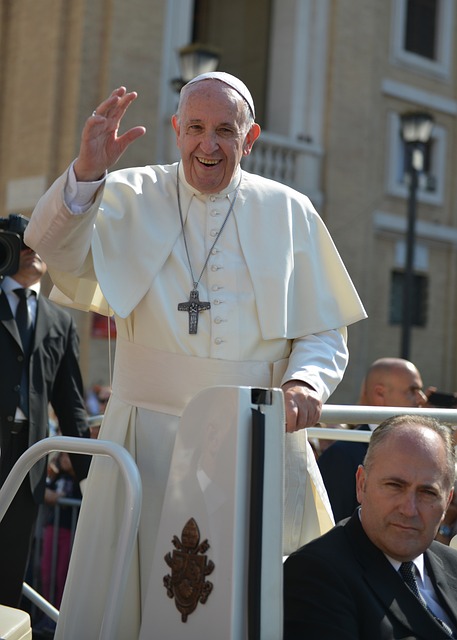Pope Francis has expressed regret about “the tragic instances of child abuse” in Belgium.
He was speaking on the first full day of an official four-day visit to the country, the first by a Pope for almost 30 years.
In a speech he touched on recent scandals that have rocked the Belgian Church as elsewhere, including cases of alleged forced adoption and sexual abuse.
The Church globally has been badly shaken by claims about alleged abuse by the clergy.
This include claims that institutions in Belgium run by nuns during the 1950s to 1980s took in underage girls and unmarried women and offered their children up for adoption. One official inquiry last year said it was estimated that between 1950 and 1980, Catholic nuns in Belgium were involved in “forcibly adopting” nearly 30,000 children. It has been reported that most cases involved unmarried women whose parents wanted to keep their pregnancy a secret, so the child was allegedly taken from them without consent and given to a different family.
Since 2012, it is believed more than 700 reports of abuse have been reported to the authorities in the country.
His address to civil authorities in Leuven on Friday (27 September) comes just six months after he defrocked a former Bishop in Belgium found guilty of abuse.
In his speech, the Pope said while the Church “carries out her mission, often with examples of great generosity and heartfelt dedication” there had been “sadly, the emergence of painful counter-testimonies.”
He added, “I refer to the tragic instances of child abuse, which is a scourge that the Church is addressing firmly and decisively by listening to and accompanying those who have been wounded, and by implementing a prevention programme throughout the world.”
He said, “In this regard, I was saddened to learn about the practice of ‘forced adoptions’ that also took place here in Belgium between the 1950s and the 1970s. In those poignant stories, we see how the bitter fruit of wrongdoing and criminality was mixed in with what was unfortunately the prevailing view in all parts of society at that time.
“This was so much the case that many believed in conscience that they were doing something good for both the child and the mother.”
He said, “Frequently, the family and other actors in society, including within the Church, thought that in order to avoid the stigma that unfortunately fell upon unmarried mothers in those times, it would be preferable for the good of both the child and the mother that the child be given up for adoption. There were even cases in which some women were not given the possibility of choosing between keeping their children or giving them up for adoption.”
He went on, “I pray that the leaders of the nations, by looking at Belgium and its history, will be able to learn from it. In this way, they can spare their peoples endless misfortunes and sorrow.”
His much-awaited visit to Belgium, where he was greeted by pouring rain on Thursday evening, features the 600th anniversary of the KU Leuven and the UCLouvain universities.
In his speech on Friday, he said he was “very pleased” to visit Belgium, adding, “When I think of this country, what comes to mind is something small yet great; a country in the west that at the same time is also at the centre, as if Belgium were the beating heart of an enormous organism.”
He said, “Indeed, it would be a mistake to judge the quality of a country by its geographical size. Belgium may not be a large state, yet its particular history has been impactful.
“Immediately after the Second World War, the exhausted and downhearted peoples of Europe, in beginning a profound process of peace, cooperation and integration, looked to your country as a natural location to establish key European institutions.”
This, he said, was because Belgium was on the “fault line” between the Germanic and Latin worlds, sandwiched between France and Germany, “two countries that had most embodied the opposing nationalistic ideals underlying the conflict.”
He said, “We could describe Belgium as a bridge between the continent and the British Isles, between the Germanic and French-speaking regions, between southern and northern Europe.
“A bridge enabling concord to spread and disputes to abate. A bridge where all people, with their own languages, ways of thinking and beliefs can meet others and choose conversation, dialogue and sharing as the means of mutual interaction.”
“A bridge where all can learn to make their own identity not an idol or barrier, but a welcoming place, from which to begin and then return; a place for promoting valuable personal exchanges, seeking together new social stability and building new agreements. A bridge that promotes trade, connects and brings cultures into dialogue. An indispensable bridge, then, for rejecting war and building peace.”
The Pope noted, “It is thus easy to see how great little Belgium really is and how Europe needs Belgium to remind it that its history comprises peoples and cultures, cathedrals and universities, achievements of human ingenuity but also many wars and the will to dominate that sometimes led to colonialism and exploitation.”
“Europe needs Belgium in order to continue along the path of peace and of fraternity among its peoples. Indeed, Belgium is a reminder to all others that when nations disregard borders or breach treaties by employing the most varied and untenable excuses, and when they use weapons to replace actual law with the principle of “might is right”, then they open Pandora’s box, unleashing violent storms that batter the house, threatening to destroy it.”
On Sunday, the Pope is due to lead a Mass in front of over 3,000 people at the King Baudouin Stadium on the outskirts of Brussels.







